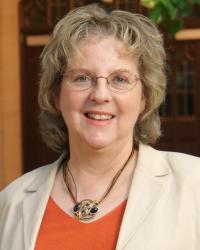How to survive—even thrive—in an era of budget cuts

Dean
Catherine Emihovich
If it’s October it must be autumn, but the weather is just now starting to catch up with the calendar. At this point, we all want relief with cooler night temperatures and drier days, but summer seems to be persistently hanging on. While we wait for the heat to dissipate on the weather side, it’s clear that faculty research accomplishments are still blazing.
Kudos to those faculty who had grants funded in August: Patricia Snyder, Lynda Hayes (PKY) and Rose Pringle, Fran Vandiver (PKY), and Kara Dawson and Cathy Cavanaugh. I encourage everyone to watch for the research bulletin the Office of Educational Research issues each month to keep up to date with all the latest research news, grant competitions, and announcements of successful proposals and new submissions. Later this month, the Office of News and Publications will roll out a new format for the College of Education Annual Report that will showcase various components of our college, faculty/student awards, exciting new initiatives, and donor gifts. Universities are quickly learning that in this media-saturated, attention-deficit world, you are only as good as the last publication touting your college’s record, and at UF we have the advantage of being able to back our claims with a solid track record of success.
Whether we will be able to keep pace with all the wonderful initiatives and projects in play, and take on new obligations, will depend in large measure on what happens with the state budget. Adequate funding for public education both at the preK – 12 and postsecondary levels is an issue that will dominate state policymakers’ discussions for many years to come, but we are now living with the reality of the impact of significant budget cuts. A difficult transition college faculty and staff need to make is to recognize that in the future, we will depend less and less on state appropriations, and more and more on revenue obtained from grants, corporate and foundation support, private donors, and distance/continuing education. In addition, the constantly changing forms of technology and the rapid advances in trans-disciplinary fields that did not even exist 10 years ago will require both faculty and staff, along with students, to master new knowledge and applications to stay competitive with other institutions at state and national levels that are facing the same challenges we do.
A very natural question people will ask is what actions can be taken now to mitigate the effects of budget cuts, and what future actions will we need to consider for moving the college moving forward in a positive and optimistic way? I noted in last month’s column that the Office of Educational Research is well prepared to assist faculty in seeking external funding. In this column, I encourage staff to think about ideas for cost savings, to find more efficient ways to accomplish certain tasks, and to suggest innovative practices. Rather surprisingly, sometimes very simple changes can result in large benefits. At the same time, I also encourage people to take as much advantage as possible of training programs on campus to enhance their skills. The economic downturn will not last forever, and people will want to position themselves to take advantage of new opportunities when they become available.
Despite all our fiscal challenges, we have a vibrant and active college, and people should not lose faith in our ability to prepare outstanding educators, conduct cutting-edge scholarship to influence policy and practice, serve the state with a focus on engaged scholarship, and establish collaborative partnerships with units across campus to expand the knowledge base in multidisciplinary areas. I close with one of my favorite quotes from Nobel Prize winner Doris Lessing: “Whatever you must do, do it now; the conditions are always impossible.”
– Dean Catherine Emihovich




